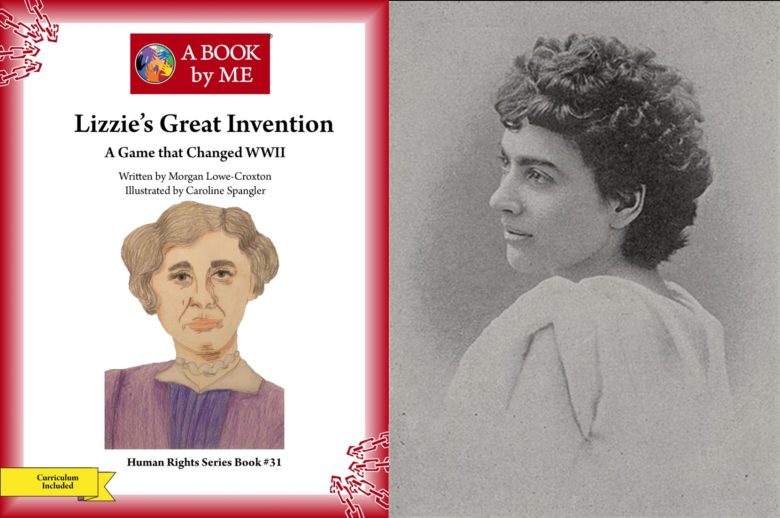Lizzie’s Great Invention
A Game that Changed WWII
Written by Morgan Lowe-Croxton
Illustrated by Caroline Spangler
For the series A BOOK by ME - True Stories Written by Kids for Kids

Artist Caroline, Deb and Author Morgan
I learned about the game Monopoly being used to help POWs escape during WWII ten years before I learned the story about a local woman named Lizzie Magie. Our part of Illinois was used greatly by the Underground Railroad to help escaped slaves flee to the north to freedom prior to the Civil War. It was very powerful for me to know that Lizzie’s family worked with the abolitionists and knew Abraham Lincoln before the war. Learning about Lizzie’s inventing the game Monopoly astonished many people near where I live. As you drive into the small town of Macomb, Illinois you will see a sign that says “Birthplace of Elizabeth Magie, Inventor of Monopoly”.
Many years later, the British secret service came up with a brilliant idea on how to use this game to equip Allied POWs with a real map and a real compass so they could escape. Lizzie couldn’t have dreamed her simple game would one day save men’s lives. Lizzie is an unsung hero but thanks to two middle school students, kids in the classroom can learn about her life and her many accomplishments. Morgan did a fantastic job writing the story and Caroline not only drew the book’s illustrations, she also did pencil drawings of all the Monopoly pieces we all know and love: the shoe, the hat, the dog, etc.
– Deb Bowen, Creator A BOOK by ME

If you’ve ever played Monopoly, you may not know that the original inventor was an amazing young woman named Elizabeth “Lizzie” Magie-Phillips who grew up in Macomb, Illinois. In the late 1800s, Lizzie came up with the original game board that served as the basis for Monopoly, but she is seldom given credit for that creation. Read about Lizzie and how Monopoly even helped prisoners of war during WWII. Then, you’ll be among those in the know!
Elizabeth “Lizzie” Magie-Phillips
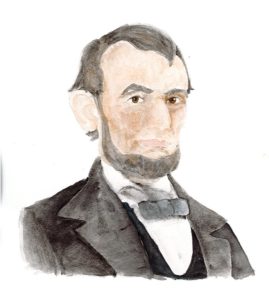 Elizabeth “Lizzie” Magie-Phillips was born to James and Mary Magie in Macomb, Illinois on May 9th, 1866. It was the year after the Civil War ended and Abraham Lincoln was assassinated. Her father was a newspaper publisher for the Macomb Journal and an abolitionist who accompanied Lincoln as he traveled around Illinois in the late 1850s debating Senator Stephen Douglas. Her father was an outspoken critic of slavery and a supporter of the Union cause, so before Lizzie was born, in the summer of 1862, he helped to organize companies for the 78th Illinois Infantry. When those men left for camp, he resigned as the “Journal” editor and enlisted as a private. During the war, as the “Chicago Tribune” later said, on June 14, 1865, he “rose to the rank of corporal, and from that to Orderly Sergeant,” and “there was not a braver man in the regiment.”
Elizabeth “Lizzie” Magie-Phillips was born to James and Mary Magie in Macomb, Illinois on May 9th, 1866. It was the year after the Civil War ended and Abraham Lincoln was assassinated. Her father was a newspaper publisher for the Macomb Journal and an abolitionist who accompanied Lincoln as he traveled around Illinois in the late 1850s debating Senator Stephen Douglas. Her father was an outspoken critic of slavery and a supporter of the Union cause, so before Lizzie was born, in the summer of 1862, he helped to organize companies for the 78th Illinois Infantry. When those men left for camp, he resigned as the “Journal” editor and enlisted as a private. During the war, as the “Chicago Tribune” later said, on June 14, 1865, he “rose to the rank of corporal, and from that to Orderly Sergeant,” and “there was not a braver man in the regiment.”
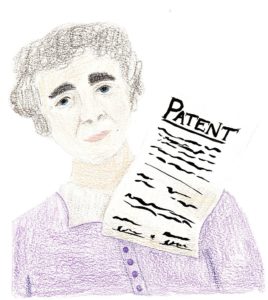 Lizzie moved to the Washington, DC area in the 1880s as a single woman and worked as a stenographer and typist. Her first patent was for a “type writing machine” in 1893 that essentially helped paper move through typewriter rollers more easily. There she was ahead of her time becoming an actress, writer, poet, pioneering feminist and an inventor who held several patents. Lizzie Magie is best known for creating Monopoly, what has become the most popular board game in the world. Lizzie’s game was very unique. It featured a path that allowed players to circle the board, in contrast to many games of the day.
Lizzie moved to the Washington, DC area in the 1880s as a single woman and worked as a stenographer and typist. Her first patent was for a “type writing machine” in 1893 that essentially helped paper move through typewriter rollers more easily. There she was ahead of her time becoming an actress, writer, poet, pioneering feminist and an inventor who held several patents. Lizzie Magie is best known for creating Monopoly, what has become the most popular board game in the world. Lizzie’s game was very unique. It featured a path that allowed players to circle the board, in contrast to many games of the day.
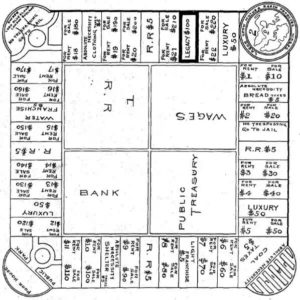 The plat of her board game seems similar to that of Macomb’s Downtown Square. In one corner were the Poor House and the Public Park, and across the board was the Jail. Macomb’s Jail, incidentally was, at that time, in one of corners of the Square. Also included on the board were three words that have endured for more than a century after Lizzie scrawled them there: “Go to Jail.” She called her creation “The Landlord’s Game” and in 1903 she filed a patent for the game. She was a pioneer because at that time less than one percent of patent holders were women. It’s said she was talented, ambitious, and outspoken, like her father.
The plat of her board game seems similar to that of Macomb’s Downtown Square. In one corner were the Poor House and the Public Park, and across the board was the Jail. Macomb’s Jail, incidentally was, at that time, in one of corners of the Square. Also included on the board were three words that have endured for more than a century after Lizzie scrawled them there: “Go to Jail.” She called her creation “The Landlord’s Game” and in 1903 she filed a patent for the game. She was a pioneer because at that time less than one percent of patent holders were women. It’s said she was talented, ambitious, and outspoken, like her father.
Charles Brace Darrow was an American inventor who modified the design of Lizzie Magie’s original invention The Landlord’s Game. His version changed properties now named after Atlantic City streets. Fixed prices were added to the board. He became the first millionaire game designer in history. Charles Darrow has falsely been credited as the original inventor. It all started one evening in late 1932 in Philadelphia when Charles and Olive Todd introduced their friends Charles and Esther Darrow to a real-estate board game they had recently learned. As the two couples sat around the board rolling dice and buying properties, the Todd’s were happy their friends liked this new game. They told them that it didn’t have an official name but it was often called the monopoly game and there were no written rules. Darrow was unemployed and he saw an opportunity to make money. He redesigned the board and gave the game the official name Monopoly and a list of rules, then sold it around town and eventually sold it to Parker Brothers. His family still received royalties today.
Lizzie was paid by Parker Brothers, too. When the game started to take off in the mid-1930s, the company bought up the rights to other related games to preserve its territory. For the patent to the Landlord’s Game and two other game ideas, Lizzie reportedly received $500 — and no royalties. If not for her trailblazing patent, the original game and Lizzie Magie herself may have been lost in history.
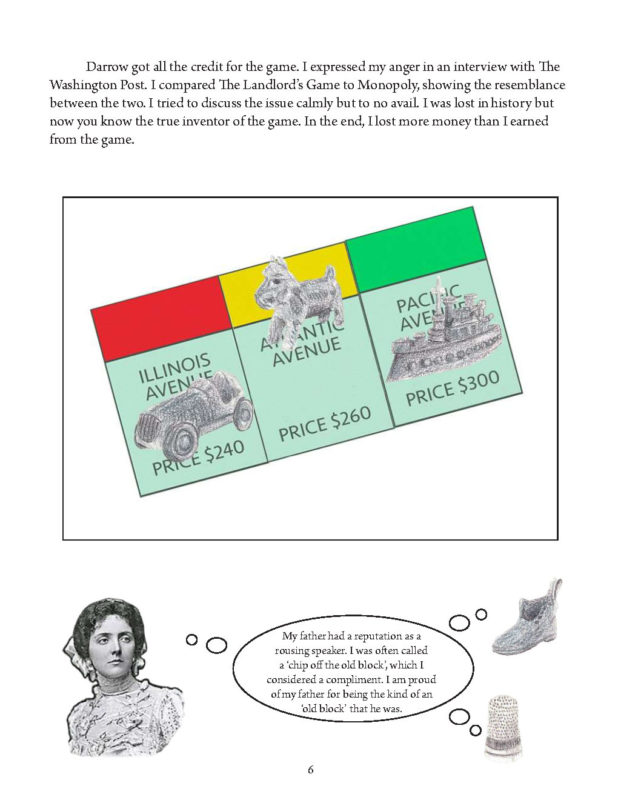
Another interesting twist to the story, most people don’t know that during WWII the child’s game, Monopoly, helped thousands of Allied soldiers escape from German prison camps. It’s a fascinating story that starts with a man named Christopher Clayton Hutton and a game company called Waddington’s who published a British version of the popular American game. Their version used the famous streets in London.
It’s said that Hutton met Harry Houdini when he was young. As an adult, he was a soldier, a journalist and inventor. He had a special fascination with escape techniques. In fact, he was employed by the British Secret Service to help prisoners of war escape from German prison camps across Europe. During the war, large numbers of British airmen crashed over enemy airspace and were then held as prisoners behind enemy lines. His unit’s goal was to get as many back to safety as possible.
Hutton experimented with lots of different escape ideas including: cloth maps sewn into uniforms, compasses so small they could be hidden on the back of buttons, blankets with clothing patterns on them, which could be cut and sewn together by POWs and shoe heels with knives hidden in them. The Nazis discovered many of these and Hutton was always thinking of new ideas.
In 1941 Hutton worked with Waddingtons on an ingenious plan to create escape kits hidden inside Monopoly boards. The escape kits included silk maps of European countries, such as Norway, Sweden, Germany, France, and Italy. Other tools like knives, metal files, miniature compasses, rope and real money were also hidden in the boards.
Hutton made sure his boards were the same weight and depth as the original Monopoly boards. Silk was the best material for the maps because it wouldn’t tear or dissolve in water as easily as paper and could be crumpled up into a small space. Silk maps wouldn’t rustle and attract the attention of prison guards.
Smuggling these boards into the Nazi prison camps was easy. As part of the Geneva Convention Germany allowed charities to send POWs games to play. The Germans thought that playing games would distract the men from trying to escape and make them easier to control.
Fake charities distributed the Monopoly boards to German prison camps for the POWs. Soldiers that were about to be sent on a mission were told about the escape kits in case they were captured. Special marks were used on the escape boards to show which map was hidden in it. This made sure that the right escape maps were sent to the right POWs. A full stop mark after Marylebone Station meant an Italian map; a full stop after Mayfair meant maps for Norway, Sweden and Germany, and one after Free Parking meant maps of Northern France and Germany.
The German soldiers were never suspicious of the monopoly games and they never discovered the hidden escape kits. It’s thought that up to 35,000 prisoners of war managed to escape prison camps in Nazi-occupied Europe. Nearly 20,000 of them had silk maps, compasses, and other supplies that had been hidden inside Monopoly boxes. Maggie would have been proud to know her invention helped save Allied lives during World War II.
“I loved learning more about Monopoly and where it came from. It was invented just minutes away from my hometown. Finding out a very popular game that was invented by someone in Macomb was a very cool discovery. Studying more about it was a very great experience, and now I get to share Lizzy’s story. A bonus was reading more about Abraham Lincoln and his contribution to Macomb and my home state of Illinois. The fact that he knew this family is just one more thing I love.”
– Author Morgan Lowe-Croxton
- Author, Morgan Lowe-Croxton
- Illustrator, Caroline Spangler
- Author and Illustrator in Macomb, Il
A BOOK by ME, a book series developed by Deb Bowen, empowers students to preserve history by telling the story of unsung heroes in our communities. For the young participants, it’s a guided cross-curricular project that gathers stories of people who do amazing things but have received little or no recognition. Students learn how to publish a picture book that is a primary source document with photographs and a biography.
Since 2003, Deb Bowen has been arranging meetings between students and individuals from the WWII generation. This intergenerational storytelling results in unique storybooks written and illustrated by kids for kids in the A BOOK by ME series. More about Deb Bowen >

